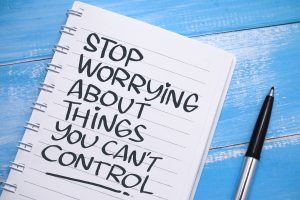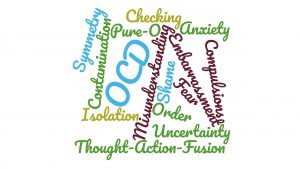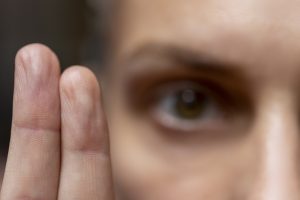CLINICAL PSYCHOLOGY
Specialised assessment, diagnosis, and treatment for specific mental health issues.
Len at Room for Positive Change, provides clinical psychology services for adults seeking treatment for:
- Specific Anxiety Disorders
- Obsessive-Compulsive and Related Disorders
- Trauma-and-Stressor Related Disorders
If you are having difficulties with any of the listed issues, contact Len at Room for Positive Change to arrange an appointment and engage with effective, evidence-based treatment.
Please Note: If you are seeking support for other conditions not listed on this website, please consider seeking alternate services as your referral may not be accepted. You may find helpful information at the Useful Links tab of this website.
All provided services adhere to the highest levels of professional integrity and practice as reflected in the APS Code of Ethics and Ethical Guidelines.
Let's Talk!
CONDITIONS TREATED
 Sometimes unexpected events and life changes can be really confusing and tough to manage. An adjustment disorder relates to a stress-related issue associated with major difficulty in adjusting to significant changes in life such as job loss, workplace bullying, relationship breakdown, or retirement. Difficulty adjusting can also be impacted by anxiety symptoms, depressed mood, and uncharacteristic behaviour problems.
Sometimes unexpected events and life changes can be really confusing and tough to manage. An adjustment disorder relates to a stress-related issue associated with major difficulty in adjusting to significant changes in life such as job loss, workplace bullying, relationship breakdown, or retirement. Difficulty adjusting can also be impacted by anxiety symptoms, depressed mood, and uncharacteristic behaviour problems.
The distress is considered severe and interferes with social, occupational, and/or other important areas of daily life.
Room for Positive Change:
- obtain emotional support & guidance
- improve stress-management
- develop effective coping skills,
 We can all get caught up in worry from time to time. For some people, the worry process really takes hold and interferes with daily life.
We can all get caught up in worry from time to time. For some people, the worry process really takes hold and interferes with daily life.
Generalised Anxiety Disorder involves at least a six-month period of frequent and excessive worry about many aspects of life such as: health, work, relationships, finances, and other issues. Such worry is often considered uncontrollable and disruptive to daily functioning (e.g., difficulty relaxing, disturbed sleep, physical tension, feeling irritable, easily fatigued, poor concentration and difficulty with focusing on a task).
Room for Positive Change:
- learn how to gain control over the worry process
- develop attentional training and problem solving skills
- better recognise & challenge unhelpful thought patterns

Trichotillomania (TTM, Trich, Hair-Pulling Disorder) is categorised as a body-focused repetitive behaviour (BFRB) and is associated with significant distress or impairment in daily life. Hair pulling can occur from any area which hair grows, results in obvious hair loss, can lead to irreparable damage, and repeated efforts to stop or reduce pulling behaviours. Some people go to great lengths to conceal the impacts of hair pulling and often experience high level shame or embarrassment.
Room for Positive Change:
- Len has specialised training and clinical experience working with people impacted by the many challenges of Trich
- engage an ACT-enhanced Behaviour Therapy approach to effective treatment
- habit reversal training
- distinguish between focused & automatic picking
- better recognise the interplay between urge & behaviour
- explore options for altering environments
- improve sense of control
 On occasion, many of us will have a general concern about our health and will take reasonable steps to deal with such. Problematic health anxiety occurs when there is a significant preoccupation with and fear of having or getting a serious illness. Subsequently, unreasonable and excessive steps are taken to identify and manage undetermined health issues. Others may put themselves at risk by avoiding all medical related investigations.
On occasion, many of us will have a general concern about our health and will take reasonable steps to deal with such. Problematic health anxiety occurs when there is a significant preoccupation with and fear of having or getting a serious illness. Subsequently, unreasonable and excessive steps are taken to identify and manage undetermined health issues. Others may put themselves at risk by avoiding all medical related investigations.
Room for Positive Change:
- better understand health anxiety
- how it develops and what keeps it going
- learn how to reduce and better manage the thoughts and behaviours that energise health anxiety
- adjust rules & assumptions around health

Experiencing random, intrusive, and upsetting thoughts is common. Behaviours of double-checking are also quite common: Is the stove really off? Did I really lock the door?
The difference with OCD is that the thoughts and behaviours are repetitive, frequent, distressing, and significantly interfere with one’s ability to engage with daily activity.
Obsessions include repetitive and persistent intrusive thoughts, images, or urges which are often in conflict with a person’s ideal or true self-image. Such obsessions are distressing, anxiety-provoking, and shame-inducing. Common obsessions include contamination, safety, concern with order and symmetry
Compulsions are often rule-heavy repetitive behaviours and rituals aimed at reducing the anxiety created by obsessions. Common compulsions include excessive cleaning, checking, ordering.
Room for Positive Change:
- collaborate on goals and desired outcomes
- identify and develop more helpful thought patterns
- improve stress management
- develop effective ways to confront situations without using your typical OCD rituals or behaviours
- develop more adaptive ways of responding to anxiety
 Recurring unexpected panic attacks which can involve sudden surges of extreme fear, matched with intense physiological arousal such as: chest pain/pressure, racing/pounding heartbeat, difficulty breathing, choking sensations, feeling dizzy/faint, trembling/shakiness, sweating, hot/cold flushes, and/or stomach problems. There is often a fear of dying, losing control, having another attack, and/or going crazy. Such fear often leads to unhelpful changes in behaviour (e.g., avoidance).
Recurring unexpected panic attacks which can involve sudden surges of extreme fear, matched with intense physiological arousal such as: chest pain/pressure, racing/pounding heartbeat, difficulty breathing, choking sensations, feeling dizzy/faint, trembling/shakiness, sweating, hot/cold flushes, and/or stomach problems. There is often a fear of dying, losing control, having another attack, and/or going crazy. Such fear often leads to unhelpful changes in behaviour (e.g., avoidance).
Agoraphobia involves fear and anxiety about two or more of the following: being in open or enclosed spaces, using public transportation, standing in line or being in crowds and/or being alone outside the home environment. Often due to fear of experiencing a panic attack where help or escape may be difficult.
Room for Positive Change:
- learn about the biology and psychology of panic
- develop relaxation and calm breathing skills
- identity and develop more helpful thought & behaviour patterns aimed at reducing panic
- develop improved confidence with engaging avoided or feared experiences

People with a specific phobia have developed an extreme fear of certain objects, activities, or situations which are unlikely to cause true harm. The experience of fear activates avoidance behaviours and intense anxiety when thinking about or encountering the source of fear. Phobias differ to typical fears, cause significant distress, and can interfere with daily living.
Room for Positive Change:
- improve relaxation techniques for a greater sense of calm
- learn helpful ways to think about and approach your fears
- develop manageable steps toward overcoming your fear
- common phobias treated thus far include: heights, lifts, vomit, needles, balloons, flying, storms, enclosed spaces
 PTSD can develop after experiencing or witnessing a traumatic event such as actual or threatened death, serious injury, natural disaster, or violence. Some of the symptoms may include flashbacks, nightmares, severe anxiety, intense fear, avoidance, and other unhelpful changes in thinking, emotions, and behaviour. If symptoms worsen or last for extended periods of time and significantly interfere with daily life, a diagnosis of PTSD is possible.
PTSD can develop after experiencing or witnessing a traumatic event such as actual or threatened death, serious injury, natural disaster, or violence. Some of the symptoms may include flashbacks, nightmares, severe anxiety, intense fear, avoidance, and other unhelpful changes in thinking, emotions, and behaviour. If symptoms worsen or last for extended periods of time and significantly interfere with daily life, a diagnosis of PTSD is possible.
Room for Positive Change:
- learn how to better manage & improve symptoms
- develop specific coping skills
- restore desired sense of self
- process trauma experience in a supportive environment
- Len has specialised training and clinical experience in recommended therapies including: Cognitive Processing Therapy, Eye Movement Decensitisation and Reprocessing, Trauma-focused Cognitive Behaviour Therapy
 Paruresis is a form of social anxiety disorder whereby some people experience intense fear and/or significant anxiety and will go to great lengths to avoid urinating in public restrooms or anywhere else other people might be present. The common worry is that one will be unable to initiate the flow of urine while in the presence of others, that others will notice such and judge harshly.
Paruresis is a form of social anxiety disorder whereby some people experience intense fear and/or significant anxiety and will go to great lengths to avoid urinating in public restrooms or anywhere else other people might be present. The common worry is that one will be unable to initiate the flow of urine while in the presence of others, that others will notice such and judge harshly.
Additional symptoms include: requiring complete privacy when using a restroom, fear that others will hear your functions, only able to use toilets at home, worry about having to use a public restroom, restricting hydration, avoiding events, and an associated negative self-view.
Over time, anticipatory anxiety compounds, self-consciousness increases, and the process of urination becomes difficult or impossible outside of comfort zones.
Room for Positive Change:
- unpack and understand the learned anxiety response
- identify the ways associated thoughts and behaviours have changed
- with guidance & support, gradually increase your capacity to engage uncomfortable situations and relieve your fears
- reduce sense of shame or embarrasment
 Chronic skin picking is categorised as a body-focused repetitive behaviour (BFRB). which causes significant distress and dysfunction, can lead to severe tissue damage, and is often met with failed efforts to stop the behaviour.
Chronic skin picking is categorised as a body-focused repetitive behaviour (BFRB). which causes significant distress and dysfunction, can lead to severe tissue damage, and is often met with failed efforts to stop the behaviour.
Room for Positive Change:
- Len has specialised training and clinical experience working with people impacted by the many challenges of picking behaviours
- engage an ACT-enhanced Behaviour Therapy approach to effective treatment
- habit reversal training
- distinguish between focused & automatic picking
- better recognise the interplay between urge & behaviour
- explore options for altering environments
- improve sense of control
 Social anxiety refers to an intense, longstanding, and debilitating fear of social situations.
Social anxiety refers to an intense, longstanding, and debilitating fear of social situations.
- better understand your experiences with social anxiety
- develop helpful thoughts and behaviours to reduce anxiety and avoidance
- explore options for behavioural experiments for gathering corrective information about self & others
- distinguish between self-focused and environment-focused attention
- gain confidence and comfort in social settings
SUPPORT WITH

Len’s coaching style is holistic, values driven and strengths based.
Explore your options for uniquely tailored, goal oriented, and solution focused coaching. Theoretically grounded and evidence-based techniques are utilised to design and implement real-life interventions that effectively assist you to achieve success.
Room for Positive Change:
- In addition to his psychology qualifications, Len is a Certified Organisational Coach with the Institute of Executive Coaching and Leadership
 Len at Room for Positive Change provides a welcoming and safe space to be yourself. He continues to engage specialised training, has experience working with gender diverse individuals, and values the life lessons often shared.
Len at Room for Positive Change provides a welcoming and safe space to be yourself. He continues to engage specialised training, has experience working with gender diverse individuals, and values the life lessons often shared.
Len is identified as a Clinical Psychologist on the Practioners List: A Community Directory for Sex and Gender Diverse Persons in South Australia.
 Whether a beloved pet or someone near and dear, death leaves a mark on those of us who remain living without them.
Whether a beloved pet or someone near and dear, death leaves a mark on those of us who remain living without them.
Whether being made redundant, dealing with the breakdown of a relationship, or entering retirement, adjusting to loss can be challenging. A complex interplay of thoughts, feelings, and behaviours can become confusing and sometimes overwhelming.
Room for Positive Change:
- space to express and process your experience in a supportive environment
- assistance with moving through and adapting to your new reality
- develop additional coping strategies.
 “The quality of our lives often depends on the quality of our habits. With the same habits you’ll end up with the same results” – James Clear from Atomic Habits
“The quality of our lives often depends on the quality of our habits. With the same habits you’ll end up with the same results” – James Clear from Atomic Habits
Room for Positive Change:
- be held accountable
- improve self-regulation
- set better systems and achieve goals
- establish better routines
- understand and work more effectively with habit loops.
 To varying degrees, we all have problems and we’re often pretty good at solving many of these problems. Sometimes we can come up with a quick-fix solution or use a strategy that worked well for us in the past. Problems become more of an issue when we’re stressed-out, when there’s no obvious solution, and when past strategies aren’t getting it done.
To varying degrees, we all have problems and we’re often pretty good at solving many of these problems. Sometimes we can come up with a quick-fix solution or use a strategy that worked well for us in the past. Problems become more of an issue when we’re stressed-out, when there’s no obvious solution, and when past strategies aren’t getting it done.
Sometimes we can benefit from looking at problems from different perspectives. Connect with Len to gain support and guidance with empowering yourself to develop or reactivate effective structured problem solving skills. Practice these skills in-session, add them to your wellbeing toolbox, and then apply such to solving specific problems in your daily life. Get it done!
Room for Positive Change:
- better recognise stressors
- improve capacity to make effective decisions
- gain confidence in managing problems.
 Mental toughness is a quality and a skill which supports our capacity to rebound from hardship and better adapt to challenge and change … to better deal with whatever life throws at us! Through dedicated effort and consistency, we can develop and improve our resilience.
Mental toughness is a quality and a skill which supports our capacity to rebound from hardship and better adapt to challenge and change … to better deal with whatever life throws at us! Through dedicated effort and consistency, we can develop and improve our resilience.
Room for Positive Change:
- identify the unique ways to improve resilience that will work for you
- become empowered to feel effective and capable of handling the unknown
- develop a mindset for success
- identity and work with your strengths
 “If you can’t love yourself how in the hell you gonna love somebody else?” RuPaul
“If you can’t love yourself how in the hell you gonna love somebody else?” RuPaul
Sexual orientation is often central to one’s self-identity. The LGBTIQ+ community has successfully advocated for equality and cultural acceptance. However, many people remain challenged with comfortable and authentic self-expression. Experiences with or fear of violence, stigma, discrimination, and exclusion can lead to diminished wellbeing.
If there are associated issues or concerns, recognise Len as an ally and friend of Dorothy
 Stress is a demand on our resources. When demand outweighs our resources we can feel overloaded, wound-up, tense, worried, and believe that we’re unable to cope. If stress is ongoing and associated symptoms persist, our physical and mental health can be negatively impacted.
Stress is a demand on our resources. When demand outweighs our resources we can feel overloaded, wound-up, tense, worried, and believe that we’re unable to cope. If stress is ongoing and associated symptoms persist, our physical and mental health can be negatively impacted.
Symptoms of chronic stress include:
- Physical: muscle tension, jaw clenching, heart palpitations, frequent headaches, disturbed sleep,
- Psychological: increased irritability or being short tempered, intense worry, fear, anxiety, sense of helplessness, impaired concentration or memory, feeling overwhelmed.
Room for Positive Change:
- develop effective relaxation techniques
- improve communication skills
- learn structured problem solving
- improve time management
- focus more on what is within our influence and control
- Develop helpful thinking patterns for reducing the experience of stress

There’s an overflow of self-help information on improving happiness, feeling good and living the good life. However, we can’t possibly engage all the suggested strategies and what works for one person may not necessarily work for another. Without knowing what to do and how best to do it, improving wellbeing can be tough.
Room for Positive Change
- explore ways to improve your psychological, social, physical, workplace, and emotional wellbeing
- manage expectations and nurture value-driven behaviour
- consider how best to increase your positive emotions and engagement
- explore ways to develop stronger relationships, develop meaning, and gain a greater sense of accomplishment
- improve self-acceptance and activate personal growth
TREATMENT METHODS

CBT is an active psychological approach which explores a wide range of strategies to help people develop improved thinking and behaviour patterns.
Essentially, the connection between thoughts, feelings, and behaviours is explored in terms of what is helpful versus unhelpful in living life the way that you want.
Specific self-help strategies for change are explored, practiced, and developed. Some of these strategies include:
- Improved awareness of and ability to change unhelpful thinking styles
- Improved knowledge and understanding of how to influence anxiety cycles
- Reduce avoidance & change behaviours that keep you stuck
- Develop skills in healthy relaxation
- Problem solving
- Improved communication skills
- Stress management
- Social skills training
 Cognitive processing therapy (CPT) is a specific type of cognitive behavioural therapy. CPT is strongly recommended for the treatment of Posttraumatic Stress Disorder (PTSD).
Cognitive processing therapy (CPT) is a specific type of cognitive behavioural therapy. CPT is strongly recommended for the treatment of Posttraumatic Stress Disorder (PTSD).
The general aim of CPT is to:
- develop confidence in evaluating and changing upsetting trauma-related thoughts
- recognise how change in thought can lead to change in feeling and behaviour
- create a new understanding and view of the traumatic event
- reduce ongoing negative effects of past trauma on current life
 Exposure and Response Prevention (ERP) is a cognitive behavioural therapy technique and is recognised as the most effective psychological treatment for Obsessive Compulsive Disorder (OCD).
Exposure and Response Prevention (ERP) is a cognitive behavioural therapy technique and is recognised as the most effective psychological treatment for Obsessive Compulsive Disorder (OCD).
Room for Positive Change
- explore associated problems and challenges bringing you to therapy
- collaborate on developing a step-ladder of desired behaviour outcomes
- with support, guidance, & motivation: learn how to best confront situations that activate obsessions or compulsions while making room for anxiety and distressing thoughts without completing the usual rituals
- develop improved distress tolerance and adaptive anxiety management
- experience reductions in OCD symptoms

EMDR (Eye Movement Desensitization and Reprocessing) is a psychotherapy that facilitates recovery from the symptoms and emotional upheaval associated with distressing life experiences.
Therapy places attention on processing the memories and emotions of past events, to alleviate the distress of current situations, and to facilitate capacity for taking future action.
 Mindfulness Integrated Cognitive Behavioural Therapy (MiCBT) incorporates practical mindfulness-based techniques paired with Cognitive Behaviour Therapy (CBT) principles.
Mindfulness Integrated Cognitive Behavioural Therapy (MiCBT) incorporates practical mindfulness-based techniques paired with Cognitive Behaviour Therapy (CBT) principles.
MiCBT is a four-stage therapeutic approach aimed at improving feelings while changing the process of thinking and unhelpful behaviours.
MiCBT Stages
- Stage 1 is focused on teaching mindfulness meditation
- Stage 2 aims to decrease avoidance habits
- Stage 3 helps to develop assertiveness skills
- Stage 4 involves focused compassion training.
 Acceptance and Commitment Therapy (ACT) aims to improve acceptance of what is beyond our personal control and to develop committed action toward value-driven behaviours.
Acceptance and Commitment Therapy (ACT) aims to improve acceptance of what is beyond our personal control and to develop committed action toward value-driven behaviours.
The process of ACT helps develop psychological skills for effective management of distressing thoughts and feelings while clarifying how to live life aligned with what is personally important and meaningful.
Let's Talk

